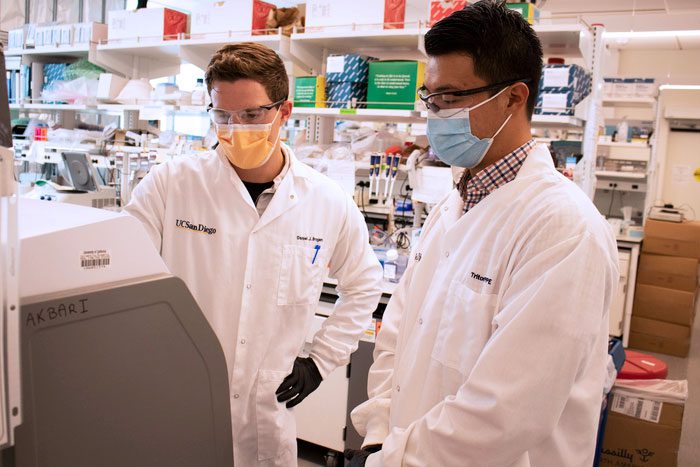Blending experts from molecular genetics, chemistry and health sciences, researchers at the University of California San Diego have created a rapid diagnostic technology that detects SARS-CoV-2, the coronavirus that causes COVID-19.
The new SENSR (sensitive enzymatic nucleic acid sequence reporter) is based on CRISPR gene-editing technology that allows speedy detection of pathogens by identifying genetic sequences in their DNA or RNA.
Currently, many human pathogens are detected using a method known as real-time polymerase chain reaction. While highly accurate and sensitive, such diagnostics are time consuming and require specialized laboratory equipment, limiting their use to health and specialized facilities. SENSR is designed to simplify the SARS-CoV-2 detection process with a goal of eventual adaptation for in-home use.
While the Cas9 enzyme has been used extensively in CRISPR genetic engineering research, scientists have recently employed other enzymes such as the Cas12a and Cas13a for the development of highly accurate CRISPR-based diagnostics. Developed in a similar vein, SENSR is the first SARS-CoV-2 diagnostic to leverage the Cas13d enzyme (specifically a ribonuclease effector called “CasRx”).
The researchers believe that in order to maximize CRISPR’s capabilities and expand the genetics-based diagnostics pipeline, any Cas enzymes that can complement or supplement existing systems should be explored.

“CRISPR has significantly advanced our capabilities for rapid identification of infected individuals and offers point-of-care testing in low-resource settings that previously wasn’t possible,” said UC San Diego Biological Sciences Professor Omar Akbari, the study’s senior author. “SENSR further opens the toolbox for CRISPR diagnostic systems and will help detect emerging pathogens before they become pandemics.”
In developing SENSR, Akbari’s molecular genetics lab worked in conjunction with Professor Elizabeth Komives’ lab in the Department of Chemistry and Biochemistry (Division of Physical Sciences) to purify SENSR proteins and Rob Knight’s lab in the Department of Pediatrics (School of Medicine and Center for Microbiome Innovation) to test SARS-CoV-2 samples.
SENSR is one of the latest developments in UC San Diego’s innovative approach to addressing the COVID-19 pandemic. The university’s nationally recognized science-based Return to Learn strategy for campus safety includes Knight’s groundbreaking wastewater screening program that enabled early detection of 85% of COVID-19 cases on campus. With nearly 10,000 students on campus in the current academic year, the Return to Learn program’s strategy, which includes high vaccination rates, has led to a COVID-19 case rate of less than 1%, becoming a model for other academic institutions.
Early tests in SENSR’s development demonstrated SARS-CoV-2 detection in less than an hour. The researchers note in the paper that further development is needed, but the technology has the potential to become a “powerful molecular diagnostic with numerous applications.”
Eventually, Akbari envisions SENSR becoming important in locations such as airports so that passengers can quickly determine whether they might be carrying a virus.
“We need to keep innovating in the detect-and-protect arena to come up with more tools so when there is another pandemic, we will have scalable point-of-care diagnostics systems in place for rapid distribution,” said Akbari.
Development of a Rapid and Sensitive CasRx-Based Diagnostic Assay for SARS-CoV-2. ACS Sensors, 29 October 2021.



